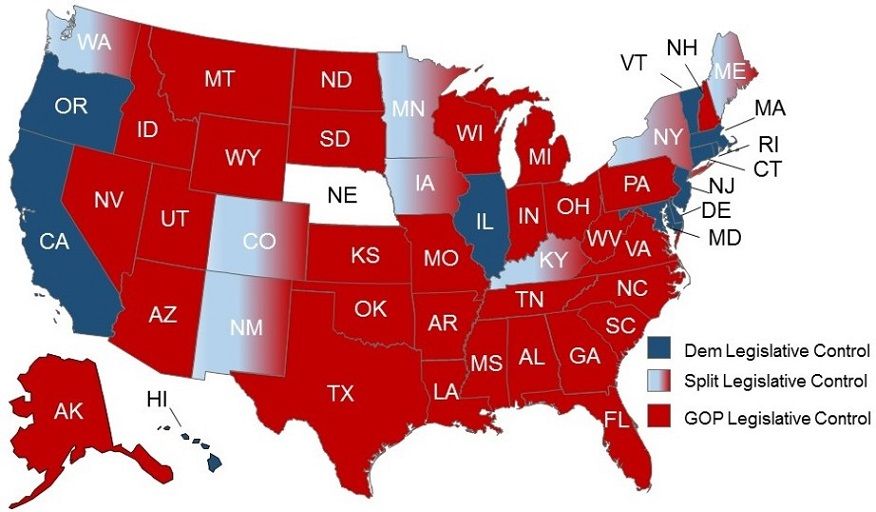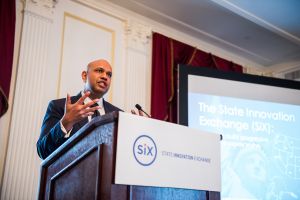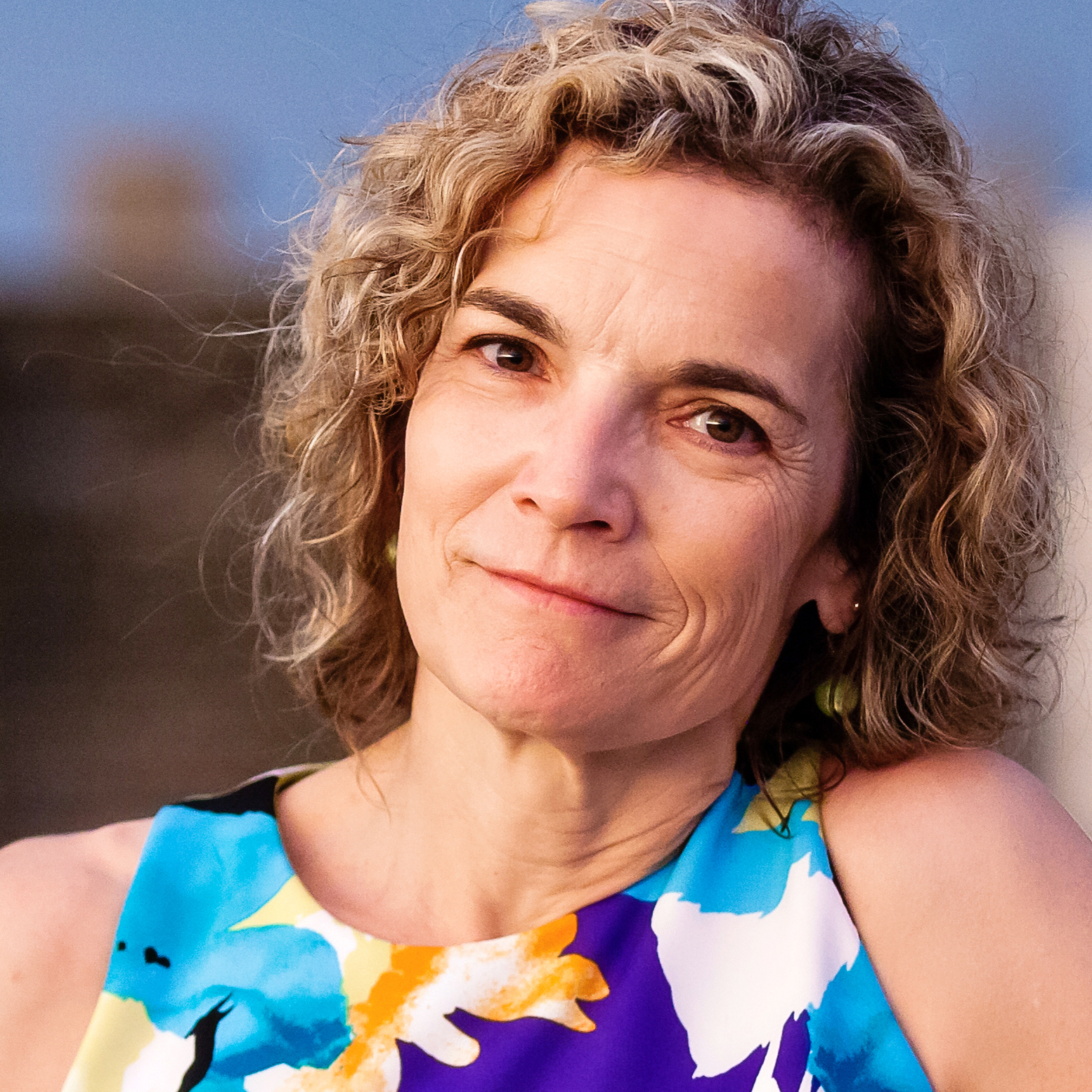
Map showing Republicans' historic high control of state legislatures. (Illustration courtesy of the State Innovation Exchange)
As Democrats gathered in Philadelphia this week to become the first major party to nominate a woman for president of the United States, one lonely evangelist has been plodding through the hoopla, trying to alert state delegation after state delegation about the big cloud on the political horizon.
What Nick Rathod has on his mind is not Donald J. Trump.
Rathod, a veteran of the Obama White House, the Everytown for Gun Safety Campaign and a founder of South Asian Americans Leading Together, now heads up the State Innovation Exchange, or SiX, as the group calls itself. Formed by a coalition of labor unions, environmentalists and women’s rights groups, SiX was launched in December 2014 out of the merger of the Progressive States Network (PSN), the American Legislative and Issue Campaign Exchange (ALICE) and the Center for State Innovation (CSI). It’s the progressive’s answer to ALEC, the American Legislative Exchange Council.
ALEC’s once under-the-radar efforts to push bills backed by business and conservative groups through state legislatures have now been widely exposed and documented by Moyers & Company and others. But while progressives have decried ALEC, a tax-exempt 501(c)3, as a backdoor for corporate influence, Rathod also sees the group as a sign that the political competition has recognized something the Democrats don’t fully appreciate.
While “Trump and Hillary are taking up all the oxygen,” he says, “really where policy making is getting done is the states.”
That’s an arena where Democrats have been losing. Big time.
While the party has been busy making history at the national level — by making Barack Obama the nation’s first African-American president, and now, by nominating Hillary Clinton to succeed him, the grass roots have been withering.
— Democratic Party activist Nick Rathod
Since 2010, in contests for state House and state Senate seats, Democrats have racked up a net deficit of 913 seats. Republicans now control 68 of the nation’s 99 state legislative chambers, a historic high. Of the 31 states where one party enjoys a “trifecta” — holding the governor’s office and majorities in both state legislative chambers — Republicans are in charge in 22.
That has enormous implications nationally.
“In 2010, we gave away the House of Representatives for a decade,” Rathod said, referring to the congressional redistricting maps, redrawn after every new Census. In most states that’s done by legislators, and in most states Republicans controlled the process. The result are district lines that are so favorable to Republicans that many experts believe it will take another redistricting for Democrats to even have a prayer of regaining the House speakership.
There are policy implications as well. SiX just issued a report detailing the difference party control of state legislatures can make, examining legislation the various states passed on such issues as the minimum wage, family leave, immigration, climate change, education, voting rights and gay rights.
In Rathod’s opinion, Democrats have only themselves to blame. Even though both President Obama and outgoing Democratic National Chairwoman Debbie Wasserman Schultz started out as state legislators, “The Democratic Party has effectively ignored down-ballot races,” he says. The situation has become so dire that Politico reports the president will campaign for state legislative candidates this fall. He has a lot of catching up to do. Republicans “have made smart and large investments in both state races and infrastructure building that has allowed them this historic control of state legislative chambers and policymaking at the state level,” Rathod says.
Prior to the 2010 cycle (the elections that would determine which party had the upper hand in the redistricting of state legislative and congressional lines that followed that year’s census), Republicans launched an effort to target state legislative races that would maximize the party’s control over the redrawing of district lines, a process overseen (and now bragged about) by the Republican State Leadership Committee.
That group was masterminded by former Republican National Chairman Ed Gillespie and former George W. Bush political guru Karl Rove — at the same time the pair was pioneering dark-money fundraising with Crossroads GPS and its associated super PAC, American Crossroads. So even as they were building a dark money machine for national races, Gillespie and Rove kept their eyes on down-ballot prizes. Tellingly, RSLC’s website presents a stark contrast to the anti-immigrant rhetoric of the national party’s presidential nominee, Donald Trump: It includes Spanish translations of much of its material and has subcommittees devoted to recruiting minority and female candidates.
As figures compiled by the Center for Responsive Politics reveal, the RSLC routinely outspends the rival Democratic State Legislative Committee better than 2-to-1.
It’s not just by getting state lawmakers elected that Republicans have out-hustled Democrats, Rathod says. Once they are in office, ALEC, the policymaking group, has come forward with model legislation (much of it helpfully provided by donors). While he may not agree with the policies, Rathod admires the “investment conservatives have made.
“They do spend time mentoring and building a team up in a way we don’t,” he says. As a result, ALEC has been able to get national results one state at a time, as with the now-infamous “stand your ground” laws implicated in the Trayvon Martin shooting. ALEC managed to get it on the books in more than 20 states.
So SiX is borrowing from the ALEC playbook. Like ALEC, SiX is organized as a 501(c)3. Like ALEC, it is compiling a library of “model legislation” and “talking points” for use by like-minded legislators. Rathod says 2017 agenda will focus on many of the same issues SiX has been working on this year and last: the economy, voting rights, environment and abortion access. In addition, Rathod says he expects to expand into criminal justice issues.
Also like ALEC, SiX is taking money from donors it doesn’t have to identify, though, according to Rathod, in much smaller numbers. ALEC’s most recent 990 (the tax document filed by charitable organizations) listed revenues of $7.8 million in 2014. SiX was too new to declare income on its most recent 990, but Rathod says the organization is working on a $2.5 million budget. Major backers include the Democracy Alliance, labor unions, Planned Parenthood, the National Resources Defense Council and the Sierra Club.
SiX has 1,500 lawmaker members and is active in all 50 states, Rathod says. He’s hopeful that the “Trump effect” will help Democrats take some legislative chambers now in Republican hands. But Rathod’s not promising any miracles. “It’s a long-term investment,” he says. “We’re in a pretty deep hole.”
He headed to Philadelphia and the convention fully cognizant of the challenge awaiting him. “It’s not very sexy,” he says of his effort to sell the importance of state legislatures. “It’s hard work.” But Rathod is also hopeful that his toughest audience — which he describes as “the donor class” and “people in Washington” — may be ready to hear his message.
“It takes losing,” he says, “to get people’s attention.”





